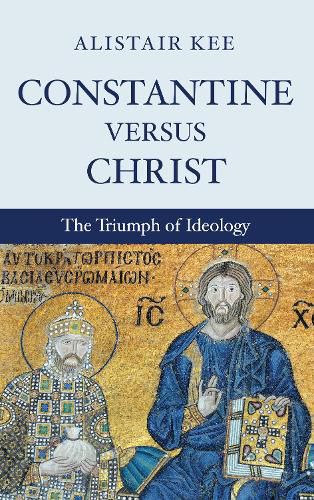Readings Newsletter
Become a Readings Member to make your shopping experience even easier.
Sign in or sign up for free!
You’re not far away from qualifying for FREE standard shipping within Australia
You’ve qualified for FREE standard shipping within Australia
The cart is loading…






This title is printed to order. This book may have been self-published. If so, we cannot guarantee the quality of the content. In the main most books will have gone through the editing process however some may not. We therefore suggest that you be aware of this before ordering this book. If in doubt check either the author or publisher’s details as we are unable to accept any returns unless they are faulty. Please contact us if you have any questions.
The subject of this book is politics and religion, the relationship between Constantine and Christianity. Something happened in the reign of the Emperor Constantine that transformed both politics and religion in Europe, and anyone who seeks to understand modern Christianity must analyze this transformation and its consequences. The reign of Constantine is remembered as the victory of Christianity over the Roman Empire; the subtitle of the book indicates a more ominous assessment:
the triumph of ideology.
Through a careful analysis of the sources, Dr. Kee argues that Constantine was not in fact a Christian and that the sign in which he conquered was not the cross of Christ but a political symbol of his own making. However, that is only the beginning of the story. For Constantine, religion was part of an imperial strategy, and the second part of this book shows just what that strategy was. Here is the development which marks a transition to a further stage, the way in which by using Christianity for his own ends, Constantine trans-formed it into something completely different. Constantine, Dr. Kee argues, along with his biographer and panegyrist Eusebius, succeeded in replacing the norms of Christ and the early church with the norms of imperial ideology. Why it has been previously thought that Constantine was a Christian is not because what he believed was Christian, but because what he believed came to be called Christian. And that represents
the triumph of ideology.
$9.00 standard shipping within Australia
FREE standard shipping within Australia for orders over $100.00
Express & International shipping calculated at checkout
This title is printed to order. This book may have been self-published. If so, we cannot guarantee the quality of the content. In the main most books will have gone through the editing process however some may not. We therefore suggest that you be aware of this before ordering this book. If in doubt check either the author or publisher’s details as we are unable to accept any returns unless they are faulty. Please contact us if you have any questions.
The subject of this book is politics and religion, the relationship between Constantine and Christianity. Something happened in the reign of the Emperor Constantine that transformed both politics and religion in Europe, and anyone who seeks to understand modern Christianity must analyze this transformation and its consequences. The reign of Constantine is remembered as the victory of Christianity over the Roman Empire; the subtitle of the book indicates a more ominous assessment:
the triumph of ideology.
Through a careful analysis of the sources, Dr. Kee argues that Constantine was not in fact a Christian and that the sign in which he conquered was not the cross of Christ but a political symbol of his own making. However, that is only the beginning of the story. For Constantine, religion was part of an imperial strategy, and the second part of this book shows just what that strategy was. Here is the development which marks a transition to a further stage, the way in which by using Christianity for his own ends, Constantine trans-formed it into something completely different. Constantine, Dr. Kee argues, along with his biographer and panegyrist Eusebius, succeeded in replacing the norms of Christ and the early church with the norms of imperial ideology. Why it has been previously thought that Constantine was a Christian is not because what he believed was Christian, but because what he believed came to be called Christian. And that represents
the triumph of ideology.